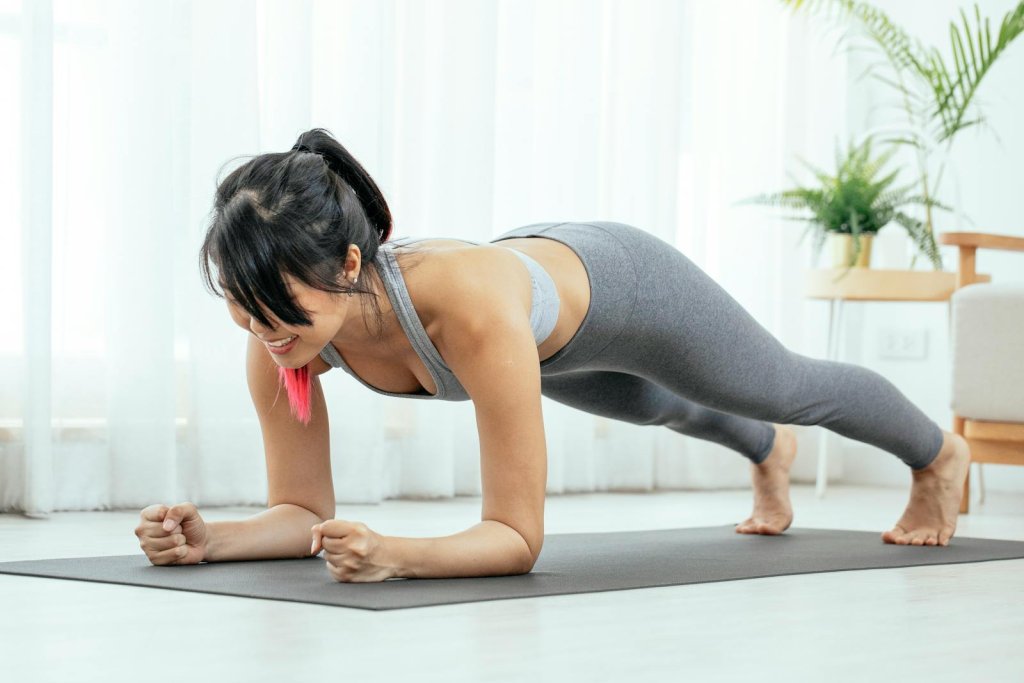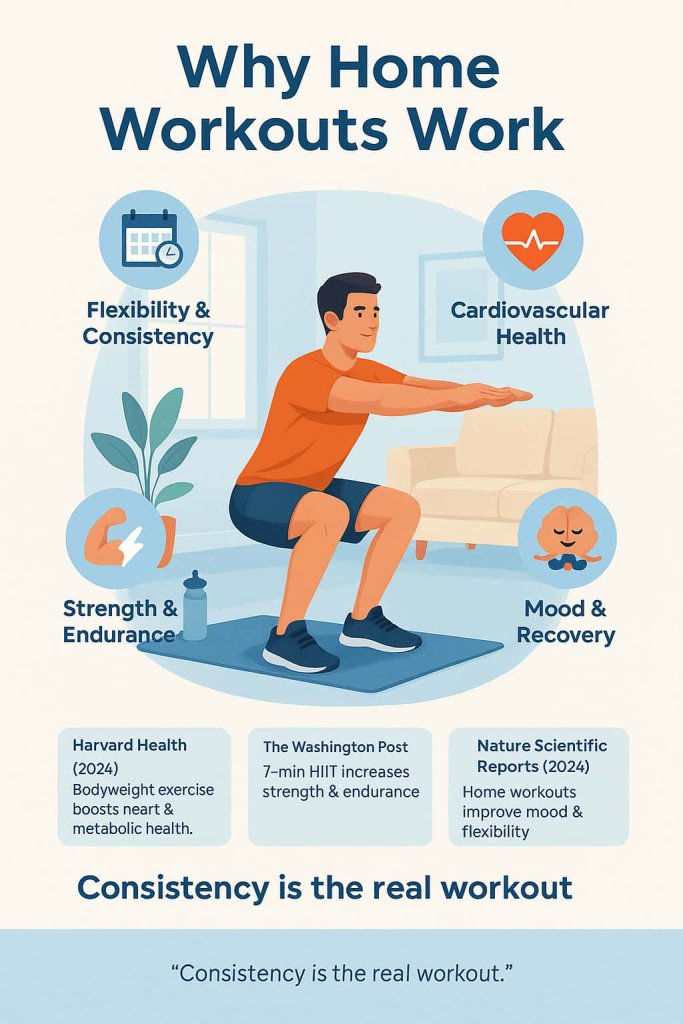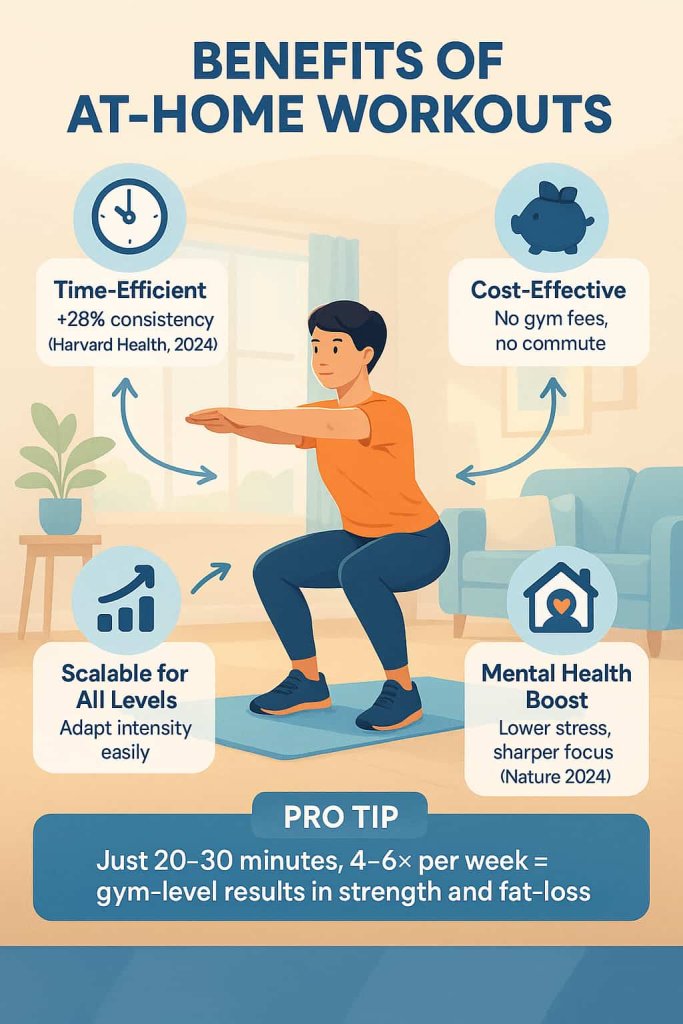Yes — you can get fit fast at home without a gym or fancy equipment.
At-home workouts improve strength, endurance, and mobility while saving time and money. Whether you’re a beginner or advanced, the right combination of exercises can transform your fitness in weeks.

Home training has evolved: short, effective routines — supported by science — are leading the fitness world. According to the American College of Sports Medicine (ACSM, 2025), bodyweight workouts, HIIT, and wearable-guided routines rank among the top fitness trends globally.
This guide covers the 20 best at-home workouts that deliver real results — backed by current research and expert insight.
Why Home Workouts Work
Training at home provides flexibility and long-term consistency — the most important predictor of fitness success.

Research highlights:
- A 2024 Harvard Health review found that consistent bodyweight exercise improves cardiovascular health and metabolic function without any equipment.
- A 2025 Washington Post report confirmed that just 7 minutes of HIIT can meaningfully increase strength and endurance when done regularly.
- Nature Scientific Reports (2024) noted that home workouts improve mood, flexibility, and muscular endurance when combined with recovery methods like foam rolling.
Benefits of At-Home Workouts
At-home workouts deliver lasting fitness results while fitting your lifestyle. Here’s why millions are switching to them:

- Time-efficient: No commute, no waiting for machines. A 2024 Harvard Health study found home exercisers were 28% more consistent.
- Cost-effective: No memberships or fancy gear needed — just your body and floor space.
- Flexible & private: Train anytime without distractions or comparison.
- Better for mental health: Nature (2024) reported that even short, home-based routines reduce anxiety and improve focus.
- Scalable for all levels: Whether beginner or advanced, you can adapt moves to your strength and mobility.
Pro Tip: A consistent 20–30 minutes of structured home exercise 4–6 times per week can match most gym programs in strength and fat-loss outcomes.
20 Best At-Home Workouts to Get Fit Fast
Below are the most effective at-home exercises — divided into strength, cardio, and mobility sections — requiring minimal to no equipment.
1. Push-Ups
Why it works:
Push-ups are one of the most efficient compound bodyweight exercises, engaging multiple upper-body muscles while building endurance, stability, and balance. They strengthen the chest and arms, improve shoulder health, and activate the core to prevent lower back strain.
Muscles worked: Pectoralis major (chest), triceps, anterior deltoids, core, and serratus anterior
How to do it:
- Begin in a high plank position, hands slightly wider than shoulder-width.
- Keep your spine neutral and engage your core.
- Lower your body until your chest nearly touches the floor.
- Push back up through your palms while maintaining a straight line from head to heels.
Trainer Tip: Keep elbows tucked at 45° instead of flaring out. Beginners can modify by doing incline push-ups (hands on a bench) or knee push-ups.
2. Bodyweight Squats
Why it works:
Squats develop leg strength and core stability while boosting metabolism. This functional movement mimics sitting and standing, enhancing mobility and balance. Studies show squats increase lower-body power and improve joint integrity when done with proper depth and control.
Muscles worked: Quadriceps, gluteus maximus, hamstrings, calves, and core stabilizers
How to do it:
- Stand tall, feet shoulder-width apart.
- Push hips back and bend knees, keeping chest lifted.
- Lower until thighs are parallel to the floor.
- Drive through heels to stand back up, squeezing glutes.
Trainer Tip: Keep knees aligned with toes and weight in heels. For extra challenge, try tempo squats (3-second descent).
3. Plank
Why it works:
The plank strengthens deep core muscles, improving posture, spinal support, and athletic performance. It also trains endurance in stabilizing muscles without joint strain.
Muscles worked: Core (rectus abdominis, transverse abdominis), glutes, shoulders, and upper back
How to do it:
- Begin on elbows or hands, body straight from head to heels.
- Engage abs, squeeze glutes, and keep shoulders over wrists/elbows.
- Hold for 30–60 seconds.
Trainer Tip: Don’t let hips sag — imagine pulling your belly button toward your spine.
4. Jump Squats
Why it works:
Jump squats improve explosive power, coordination, and cardiovascular fitness. They activate fast-twitch muscle fibers, crucial for athletic performance.
Muscles worked: Quads, hamstrings, glutes, calves, and core
How to do it:
- Start in a squat position.
- Explosively jump upward, extending arms overhead.
- Land softly, immediately descending into the next squat.
Trainer Tip: Keep chest upright and land with bent knees to absorb impact.
5. Mountain Climbers
Why it works:
A dynamic, full-body cardio move that elevates heart rate while targeting the core and shoulders. Great for burning calories and building endurance in short intervals.
Muscles worked: Core, shoulders, triceps, hip flexors, and quads
How to do it:
- Begin in a plank position.
- Drive one knee toward your chest, then switch rapidly.
- Maintain a strong core and consistent breathing.
Trainer Tip: Move fast for cardio or slow for deep core activation.
6. Lunges
Why it works:
Lunges enhance balance, coordination, and unilateral strength. They mimic natural movement patterns, improving hip mobility and joint stability.
Muscles worked: Quads, glutes, hamstrings, and calves
How to do it:
- Step forward with one leg, lowering until both knees are at 90°.
- Keep front knee over ankle and back straight.
- Push through front heel to return to start.
Trainer Tip: Perform reverse lunges for less knee strain.
7. Glute Bridges
Why it works:
Activates glutes, a muscle group often weakened by sitting. Builds hip stability and alleviates back discomfort.
Muscles worked: Gluteus maximus, hamstrings, core, lower back
How to do it:
- Lie on your back with knees bent, feet hip-width apart.
- Lift hips until shoulders, hips, and knees form a line.
- Squeeze glutes at the top and lower slowly.
Trainer Tip: Add a pause at the top or resistance band around knees to increase tension.
8. Burpees
Why it works:
A total-body conditioning move that improves strength, stamina, and coordination while torching calories.
Muscles worked: Chest, triceps, shoulders, legs, core
How to do it:
- From standing, squat down and place hands on floor.
- Jump feet back into plank, do a push-up, then jump feet forward.
- Explode upward with a jump.
Trainer Tip: Keep your form tight — quality over speed.
9. Side Plank
Why it works:
Improves lateral core stability, shoulder endurance, and balance. Strong obliques protect your spine and enhance posture.
Muscles worked: Obliques, glutes, shoulders, deep core muscles
How to do it:
- Lie on one side, forearm under shoulder.
- Stack feet and lift hips, forming a straight line.
- Hold for 20–45 seconds per side.
Trainer Tip: For beginners, bend bottom knee for extra support.
10. Jumping Jacks
Why it works:
A classic cardio move that elevates heart rate, improves blood flow, and loosens muscles before workouts.
Muscles worked: Legs, shoulders, core, calves
How to do it:
- Jump feet apart while raising arms overhead.
- Return to start position and repeat rhythmically.
Trainer Tip: Perform as a warm-up or in HIIT circuits for 30–60 seconds.
11. Chair Dips
Why it works:
Targets triceps and shoulders, promoting better upper-body definition and endurance.
Muscles worked: Triceps, deltoids, chest
How to do it:
- Sit on a chair’s edge, hands beside hips.
- Slide hips off the seat and bend elbows to lower body.
- Press back up to starting position.
Trainer Tip: Keep elbows close and shoulders relaxed. Straighten legs for a harder version.
12. Wall Sit
Why it works:
An isometric exercise that strengthens lower-body endurance without movement — great for joint-friendly conditioning.
Muscles worked: Quads, glutes, hamstrings
How to do it:
- Stand with your back flat against a wall.
- Slide down until thighs are parallel to floor.
- Hold 30–60 seconds.
Trainer Tip: Add pulses or heel lifts for advanced variations.
13. Step-Ups
Why it works:
Improves functional leg strength and balance, mimicking daily activities like climbing stairs.
Muscles worked: Quads, glutes, hamstrings, calves
How to do it:
- Use a stable chair or step.
- Step up with right foot, press through heel, then bring left foot up.
- Step down and repeat on opposite side.
Trainer Tip: Keep movements slow and controlled.
14. High Knees
Why it works:
Boosts heart rate, improves agility, and activates hip flexors — a perfect move for fat burning and speed.
Muscles worked: Quads, calves, glutes, core, hip flexors
How to do it:
- Run in place, lifting knees to waist level.
- Maintain quick tempo and engage your core.
Trainer Tip: Keep your chest tall and land lightly on balls of feet.
15. Superman Hold
Why it works:
Counteracts spinal flexion from sitting, improving back strength and posture.
Muscles worked: Lower back, glutes, hamstrings, shoulders
How to do it:
- Lie face down, arms extended overhead.
- Lift arms, chest, and legs off the floor simultaneously.
- Hold for 15–30 seconds, then lower.
Trainer Tip: Keep gaze down to prevent neck strain.
16. Standing Side Crunches
Why it works:
Strengthens obliques dynamically, enhancing waist definition and trunk control.
Muscles worked: Obliques, abs, hip flexors
How to do it:
- Stand tall with hands behind head.
- Lift right knee to meet right elbow; crunch.
- Return and repeat on left side.
Trainer Tip: Move slowly and control each rep for maximum engagement.
17. Shadow Boxing
Why it works:
A cardio-intensive, coordination-enhancing move that improves agility and upper-body endurance. It also boosts focus and releases stress.
Muscles worked: Shoulders, biceps, triceps, core
How to do it:
- Adopt a boxing stance.
- Throw combinations (jab, cross, hook) for 30–60 seconds.
- Pivot hips with each punch for power.
Trainer Tip: Engage your abs and visualize your target for precision.
18. Resistance Band Rows
Why it works:
Simulates rowing to build a strong back and improve posture. It’s especially beneficial for counteracting rounded shoulders from desk work.
Muscles worked: Lats, rhomboids, biceps, rear delts
How to do it:
- Anchor the band securely at chest level.
- Pull handles toward your torso, squeezing shoulder blades.
- Control the release.
Trainer Tip: Focus on pulling with elbows, not hands.
19. Bear Crawl
Why it works:
A dynamic, core-heavy movement improving coordination, shoulder stability, and overall body control.
Muscles worked: Core, shoulders, quads, glutes, chest
How to do it:
- Start on all fours with knees an inch off the floor.
- Move opposite hand and foot forward together.
- Crawl 10–15 steps, then reverse.
Trainer Tip: Keep your spine neutral — avoid raising hips too high.
20. Yoga Flow (Sun Salutation)
Why it works:
Increases flexibility, balance, and blood circulation. It calms the nervous system and aids recovery, especially after intense workouts.
Muscles worked: Full body — shoulders, core, hamstrings, hips, spine
How to do it:
- Start in mountain pose → forward fold → plank → cobra → downward dog → back to mountain.
- Move smoothly with deep, controlled breaths.
Trainer Tip: Use it as a warm-up or cool-down. Sync movement with breath to maximize recovery.
Sample Home Workout Plan (Science-Based)
| Day | Focus | Example Routine |
|---|---|---|
| Mon | Full Body HIIT | Burpees, Jump Squats, Plank (3 rounds) |
| Tue | Core & Balance | Plank, Side Plank, Superman Hold |
| Wed | Lower Body Strength | Squats, Lunges, Glute Bridges |
| Thu | Active Recovery | Yoga Flow or Stretching |
| Fri | Upper Body Focus | Push-Ups, Chair Dips, Band Rows |
| Sat | Cardio Burn | High Knees, Jumping Jacks, Mountain Climbers |
| Sun | Rest | Light walk or foam rolling |
💡 Pro Tip: Keep sessions between 20–30 minutes. Consistency > duration.
Pro Tips for Success with At-Home Workouts
- Set up your space: Keep your mat, bands, or weights accessible.
- Use apps or wearables: Track heart rate and performance. (ACSM, 2025)
- Prioritize form: Proper movement > higher reps.
- Mix training styles: Alternate HIIT, yoga, and resistance for variety.
- Stay consistent: Schedule workouts like appointments.
- Recover smart: Sleep 7–8 hours and hydrate well.
Trainer Tip: Progress is built daily — focus on effort and frequency, not perfection.
Common Mistakes to Avoid During Home Workouts
- Skipping warm-ups — raises injury risk.
- Rushing reps — focus on control.
- Neglecting form — use mirrors or apps for feedback.
- Ignoring rest — recovery days improve progress.
- Overtraining — start slow and increase weekly.
- No tracking — record time, sets, or photos weekly.
Trainer Tip: Small improvements tracked over time equal long-term transformation.
FAQs
1. How long should an at-home workout last?
20–30 minutes is ideal for most people. Even 10-minute HIIT sessions can be highly effective.
2. Do I need equipment?
No. Bodyweight alone is enough, but bands or dumbbells can boost strength gains.
3. How often should I work out at home?
Aim for 4–6 days a week, alternating strength and cardio days.
4. Are home workouts as effective as gym workouts?
Yes — studies show similar benefits when intensity and consistency are maintained.
5. What’s the best workout for fat loss?
HIIT and circuit training that combine strength and cardio yield the fastest fat-burning results.
6. How do I stay motivated at home?
Use fitness apps, join online challenges, or track progress with wearables.
7. Is stretching necessary after at-home workouts?
Absolutely. It improves recovery, reduces soreness, and maintains flexibility.
Conclusion
You don’t need a gym to get strong, lean, and energized — you just need commitment and smart movement. These 20 best at-home workouts are simple, scalable, and proven to work.
Start small, stay consistent, and track progress.
👉 Begin today — your home is now your gym!
References
- WHO — Physical activity recommendations for adults — 150–300 min/week moderate or 75–150 min/week vigorous activity; “any activity is better than none.”
- Low-Volume HIIT Meta-analysis (Appl Physiol Nutr Metab, 2024) — LV-HIIT significantly improves cardiometabolic health and body composition—ideal for “get fit fast” at home.
- Home-Based Exercise Meta-analysis (PLOS ONE, 2024) — Home programs improve lower-extremity strength, balance, mobility, and quality of life.
- Plyometric Training Meta-analysis (Scientific Reports, 2025) — Plyos (e.g., jump squats) significantly enhance lower-limb power and agility.
- Foam Rolling Meta-analysis (Sports Med Open, 2019 — open access) — Foam rolling improves flexibility and soreness without impairing performance; supports your warm-up/cool-down guidance.
